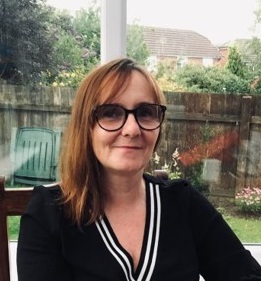Home News & Views Behind the mask
Behind the mask

Joanne Mohammed
My experience of nursing during the pandemic has been different than most of my colleagues. There have been no heroics and no ‘fighting COVID on the frontline’. Being profoundly deaf and wearing bilateral hearing aids, as PPE requirements proliferated at the start of the crisis, it became quickly apparent that I wasn’t going to be able to communicate, as masks obliterated any chance of lip reading on which I rely. A frank, constructive and compassionate discussion with my line manager ensued and I was redeployed into a non-patient facing role.
It has been a strange time for me as I am sure it has been for many. Initially, I struggled with a kind of grief in response to the loss of my ability to carry out the role that I have trained for. A role that I have done for many years and that I am skilled in. I have extensive experience in respiratory medicine and have missed out on fantastic learning opportunities in relation to the management of the novel coronavirus. I have missed the camaraderie of working on the wards and the support of having familiar colleagues and friends around me to chat to and pick me up when I was feeling down. Most of all I have missed the patient contact, the lack of being able to nurse and care for people, the reason that I chose the job that I do.
What I have gained however is a new set of skills and I have met some colleagues that I wouldn’t have done in ordinary circumstances, as I am working with a newly established team. We are building our own little support network, getting to know each other. We check in twice a day and I try to use this as an opportunity for them to voice any issues and concerns. Sometimes however, it’s just an excuse for a chinwag and that’s fine too. We have chatted about our feelings from time to time. Some in the group refer to us as ‘the misfits’, in recognition of our collective identity as those that have moved from their usual workplace for a variety of reasons because of the impact of the pandemic. There is acknowledgement that this space and time in our lives is hopefully only temporary and that eventually things will return to normal and we can resume the roles that we have chosen.
For me, the thing that stands out is that I wouldn’t have been able to carry out any work without my accessible technology. For years I have struggled with the telephone, but my new hearing aids allow me to connect via Bluetooth with ease and clarity that I never had before. The telephone is now my main method of communication. Microsoft Teams, which has revolutionised how my organisation works, is amazing in that it allows me to lip read and again connect via Bluetooth with my aids. It also creates ‘captions’ (or subtitles) in real time which help if I miss anything. In a situation where I am excluded from the workplace by virtue of my disability, accessible technology has kept my foot in the door. It has enabled me to do something useful in the absence of my usual role – a sentiment that has been echoed by other members of the team. The work that we are doing has given us some purpose. For staff that have been redeployed I think that it is important to acknowledge that.
Finally, as restrictions begin to lift and life is gradually returning to some kind of normal, be it a ‘new normal’, life for the deaf/hearing impaired community is going to get more difficult and restrictive. I watch with growing panic the news programmes reporting on the government decisions making it mandatory that face coverings are worn more frequently throughout our everyday lives. From this week, all staff and patients have to wear them at all times within our hospitals. How will I hear? What work will I be able to do? Whilst I fully understand the need for PPE, what I fail to understand and what makes me increasingly angry, is that it seems that there has been little attempt to mitigate the effect this blanket implementation will have on deaf/hearing impaired people. There are no alternative masks available freely to facilitate lipreading and thus communication.
Clear/transparent masks are needed urgently. Whilst exclusion from the workplace is acceptable as an immediate response to the pandemic, it is not a long-term solution to this issue. I need to get back into clinical practice and back to the job that I love. In order to do this, I need transparent masks to facilitate communication, something that other deaf colleagues have been campaigning for. We need the government, NHS organisations and trade bodies to get behind us on this and come up with a solution. It’s not equitable and it’s not fair that we are in this position. The benefits will not just be for staff but for our patients too. At this time my emotions are high, and my resilience is lower than usual. It will not take much to upset me and I am sure I am not alone in feeling this way. So, I would like to ask all of those who are reading this, to have understanding and patience with those who are deaf/hearing impaired at this difficult time. Try and facilitate communication in any way possible – it will help enormously.
Be kind …
Comments are closed.

